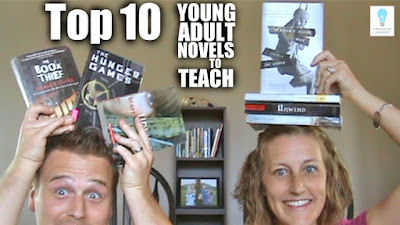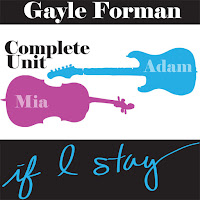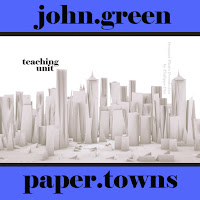Today, we’re gonna share ten Young Adult novels that will engage students and give teachers lots to explore.
Watch the YouTube video here >>> https://youtu.be/w5RmSEtWc7k
 We know many teachers are always looking for a good new book recommendation to teach, so we wanted to give you our list. First off, let’s define young adult literature. You (look at Jonathan) created your own class in your masters program to study the definition of young adult, so why don’t you define it for us. 🙂
We know many teachers are always looking for a good new book recommendation to teach, so we wanted to give you our list. First off, let’s define young adult literature. You (look at Jonathan) created your own class in your masters program to study the definition of young adult, so why don’t you define it for us. 🙂
Sure, yeah, that was a really fun class by the way. I got to study lots of young adult novels and read tons of the scholarly discussion on the topic. So here’s my definition:
The label “Young Adult” refers to a story that tackles the difficult, and oftentimes adult, issues that arise during an adolescent’s journey toward identity, a journey told through a distinctly teen voice that holds the same potential for literary value as its “Grownup” peers.
So it has to tackle difficult issues and be told through a teen voice … those are important distinctions.
And you see this as different from children’s literature?
Yeah, there aren’t any firm hard age lines, but definitely a difference. I think 13 years old is a good starting point. 13-18 is a good starting line.
Okay, so let’s get started. We’ve got 10 young adult recommendations for you today … some older, lesser discovered works and some newer ones. Because these stories are all tackling real teenage issues, there are bound to be scenes or topics in them that some people will find objectionable. Please read them and decide for yourself (or Google them).
Though a couple of them required parent permission to read, I had all of these in my classroom library and students read them every year. We think they’re amazing stories that would yield wonderful learning experiences for all classrooms allowed to teach them. Here we go …
____________________________________
First, the HONORABLE MENTIONS
 In the world of UGLIES by Scott Westerfeld, teenagers undergo the government-paid-for surgery to become beautiful just like everyone else in society on their 16th birthday. There’s a lot of high action and some teen romance in this to go around, as well as the dystopian world that takes us into all the timely conversations about the full tapestry of human beauty and our insecurities about ourselves and each other.
In the world of UGLIES by Scott Westerfeld, teenagers undergo the government-paid-for surgery to become beautiful just like everyone else in society on their 16th birthday. There’s a lot of high action and some teen romance in this to go around, as well as the dystopian world that takes us into all the timely conversations about the full tapestry of human beauty and our insecurities about ourselves and each other.
 In FEED by M.T. Anderson, the moon (the 51st US state) is an industrialized wasteland like Earth and the place teenagers like to go hangout after school. We’ve developed a technological marvel called the Feed, surgically implanted in our brains so we can communicate and be entertained 24-7. The Feed knows everything we want and gives it to us immediately. What could be wrong with that?! In this believable future, Beauty and Art have been lost and we’re forced to make the decision — What are we going to let define us?
In FEED by M.T. Anderson, the moon (the 51st US state) is an industrialized wasteland like Earth and the place teenagers like to go hangout after school. We’ve developed a technological marvel called the Feed, surgically implanted in our brains so we can communicate and be entertained 24-7. The Feed knows everything we want and gives it to us immediately. What could be wrong with that?! In this believable future, Beauty and Art have been lost and we’re forced to make the decision — What are we going to let define us?
 I AM THE MESSENGER (or THE MESSENGER in Australia) by Markus Zusak tells the story of totally average nineteen-year-old taxi cab driver Ed Kennedy. His problems start when the whole town falsely praises him for foiling a bank robbery. Then the first mysterious playing cards start appearing in his mailbox. Each card has a message for him to deliver. Or else. As Ed starts to obey the blackmailers, he realizes he’s delivering simple, personalized messages of love to difficult people.
I AM THE MESSENGER (or THE MESSENGER in Australia) by Markus Zusak tells the story of totally average nineteen-year-old taxi cab driver Ed Kennedy. His problems start when the whole town falsely praises him for foiling a bank robbery. Then the first mysterious playing cards start appearing in his mailbox. Each card has a message for him to deliver. Or else. As Ed starts to obey the blackmailers, he realizes he’s delivering simple, personalized messages of love to difficult people.
 Markus Zusak’s THE BOOK THIEF is an astounding piece of literature narrated by the character Death. What does Death think about our wars? Our famines? Our day-to-day lives? We may not often think about such things, but he does. It’s his job to see the world as it is. Infinite in color. And fear. Especially in Nazi Germany. So when Death gets fascinated by young German foster girl Liesel Meminger, we do too. This story pays tribute to the simple power of words, to their ability to change our minds, destroy our lives, move our souls, recount our memories, and yes, heal our world.
Markus Zusak’s THE BOOK THIEF is an astounding piece of literature narrated by the character Death. What does Death think about our wars? Our famines? Our day-to-day lives? We may not often think about such things, but he does. It’s his job to see the world as it is. Infinite in color. And fear. Especially in Nazi Germany. So when Death gets fascinated by young German foster girl Liesel Meminger, we do too. This story pays tribute to the simple power of words, to their ability to change our minds, destroy our lives, move our souls, recount our memories, and yes, heal our world.
____________________________________
____________________________________


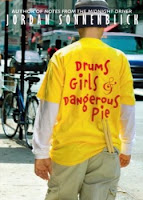

















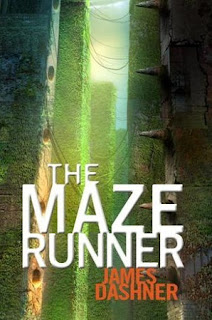





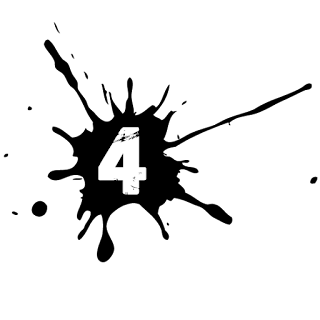











Maybe Alaska, the girl who intrigues everyone she meets, is right. Maybe “straight and fast” is the best way to navigate this life.
Miles Halter may not have a clue about Alaska or her philosophy on life, but if you try to stump him, you’ll soon learn that when it comes to the last words of famous people he knows his stuff. They’ve always intrigued him, as if someone’s last words say “in bulk” who someone really is as a person. When Miles leaves for boarding school, he doesn’t expect to experience much of the Great Perhaps, but he’s glad he does, even if it changes his life forever. His life collision with the Colonel, Lara, Takumi, and especially Alaska, fills his life with something he’s never had, both friends and experiences he’ll never forget.
But it’s the questions that rise from The Old Man’s religion class that open up their lives and take this book to a level deeper than most YA books I’ve ever read.
“How will we ever get out of this labyrinth of suffering?” “How do you fit the uncontestable fact of suffering into your understanding of the world?” “How do you hope to navigate through life in spite of it?” “What is your cause for hope?”
Big questions, certainly. Questions that thinking adults sometimes stop to ask themselves, and now perhaps, so do young adults.
Conversation of the Day: What young adult book (not children’s book) do you think belongs on the list or honorable mention and why?
Hop on over to watch the video and share your thoughts in the conversation.

